
Here is another in my rotating series of Shadow Two-Minute Mysteries. Two minutes? Yeah, that’s about how much time you’ll invest in reading it. But can you solve the mystery along with The Shadow? That may take more than two minutes. Just look at the clews, and test your sleuthing skills.
This mini-mystery originally appeared on my “Shadow in Review” website. The one presented here today was one of those. Perhaps you’ll remember it, and remember the solution, as well. And perhaps not…
This mystery is based upon the original 1930s pulp character, The Shadow. Not the radio version. No clouding men’s minds, here. Just a black cloak and slouch hat.
The solution, not necessarily the only solution, but the one the author had in mind, will appear (below) next Friday. That gives you time to mull over the crime.
Feel free to leave your solution in the comments section below. It may be better than mine!
Finally, there are some background notes at the end of the story. They’ll explain a bit more about the characters and situations in this mini-mystery, and their part in the larger universe of the pulp Shadow.
You are about to enter the pulp world of the 1930s. Join The Shadow as he dons his black cloak, slouch hat, and gloves, and prepares to battle crime. It’s time for action and mystery. The Shadow knows!
Death in the Easter Basket
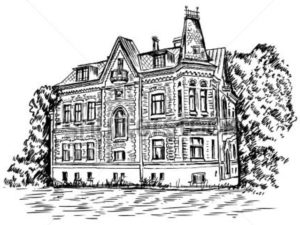
Lamont Cranston was a house guest of Ragsdale Heath. He had been staying at Heath’s Long Island estate for the past week. The two men sat on the patio, smoking cigars, and enjoying the beauty of the lush oriental gardens.
They heard the front doorbell, and shortly thereafter a servant announced, “Commissioner Weston and Wilton Lasse.”
Heath and Cranston arose as the commissioner, a brusque man of military bearing, stepped through the patio doors. A thin nervous-looking man followed behind.
“Excuse me,” began the commissioner. “We have a… er… situation…”
“Situation, nothing!” exclaimed Lasse, excitedly. He pointed his finger at Ragsdale Heath. “He murdered his own brother! And I can prove it.”
Ragsdale Heath stood there stunned. There was a grim look on Cranston’s face.
“Come out to the gardens, and I’ll show you where I saw him bury the murder weapon.”
Thirty minutes later, they were back at the broad patio. Commissioner Weston held a long-bladed knife in his hands. The murder weapon had indeed been found, just where Wilton Lasse had indicated.
“How did you know the knife was there?” began Weston.
“I saw him bury it, although at the time I didn’t realize its significance. I remember it clearly. I was a house guest here last spring. It was the week following Easter, on a Friday night. It was just after midnight. I couldn’t sleep and was looking out of my second-floor bedroom window.”
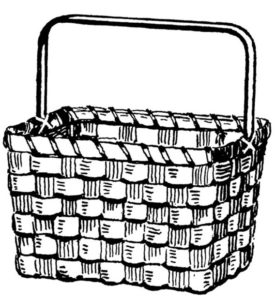
The sound of crickets filled the warm night air as Lasse paused. “I saw Heath skulking across the lawn carrying an Easter basket. I remember thinking it was strange, considering how Easter had just passed. He took a knife from the basket and buried the it in the flower beds.”
“Why didn’t you come forward with this information sooner?” This from Cranston.
“I left for South America the following morning before the murder was discovered,” explained Lasse. “I just returned and heard about the case. I realized the importance of what I’d seen, and came to see you immediately, commissioner.”
Weston turned to Ragsdale Heath. “Who else was in the house that night?”
Heath paused briefly. “Counting the other guests, there were five other men. It could have been any one of them that Lasse saw.”
“No, the moon was full, the skies were cloudless and I saw your face clearly.” Lasse sputtered indignantly. “It was you!”
“That’s good enough for me,” Weston gruffed. “Let’s go down to headquarters…”
“Not so fast, commissioner,” Cranston’s steady voice interrupted. “Wilton Lasse is lying. He planted the knife himself.”
HOW DID THE SHADOW KNOW?
■ ■ ■
[learn_more caption=”Click here for the solution.”] Lasse claimed to see Heath clearly in the full moon on the Friday after Easter. There is never a full moon that soon after Easter. The full moon always appears just before Easter. Since Lasse couldn’t have seen Heath burying the knife as he claimed, it’s most likely he knew it was there because he put it there himself. The Shadow knows![/learn_more]
Background notes
The Shadow pulp magazine stories rarely had special holiday stories. There were no Christmas tales, no Independence Day stories, no Thanksgiving mysteries. Mardi Gras was used in two of the stories, and some special local holidays were featured in some of the pulp novels. But, the most that the reader could usually expect was typical of this passage: “The upper concourse of the Grand Central Station was thronged with holiday travelers.” That was from the 1934 story “The Green Box.” And no mention of which holiday, either. Just the passing comment.
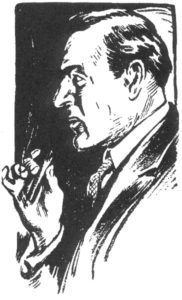
To keep these Shadow Two-Minute Mysteries faithful to the original pulp characters, locations, and situations, holidays are rarely mentioned. There was never a mention of Easter. So this mini-mystery marks a departure from that policy. It will be the exception, not the rule.
Lamont Cranston appears in this story as a house guest of Ragsdale Heath. In the original magazine series, Cranston was a highly sought-after house guest. That was due in part to his high social standing. He was a millionaire and a member of Manhattan’s most elite clubs, such as the Cobalt Club. Even the wealthiest of New York’s elite found it a status symbol to have Cranston stay with them.
Another reason that Cranston was always welcome in the homes of the wealthy was that fellow house guests clamored to hear of his exploits around the world. Cranston was a renowned world traveler and explorer. It was considered quite a coup to have him stay a few days and tell of his astounding experiences in the far-off exotic lands. He was an accomplished storyteller who could entrance his listeners for as long as he would deign to speak.
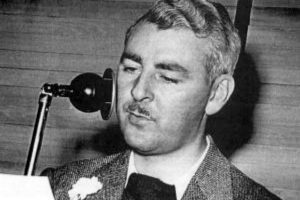

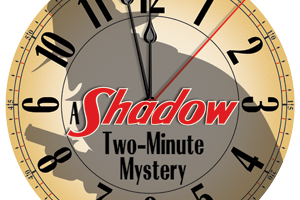
Easter always falls on the first Sunday after the full moon that follows the vernal equinox. Since it was the Friday after Easter, the moon couldn’t be full. The Shadow knew!
Easter follows the Paschal full moon, which is why Easter falls on such a wide range of Sundays. Since the Friday following Easter would have the moon waning there could not have been a full moon as Wilton Lasse stated. The Shadow (and Google) knows.